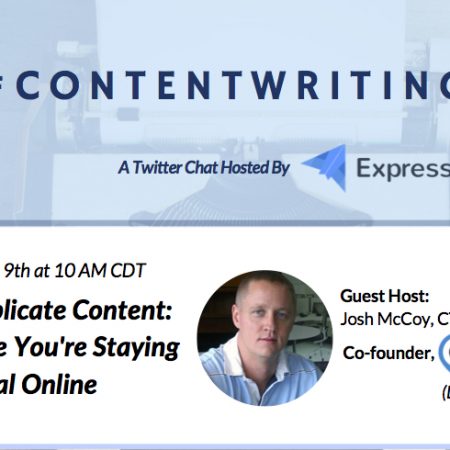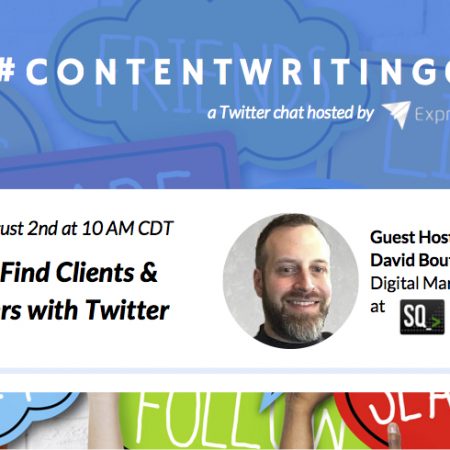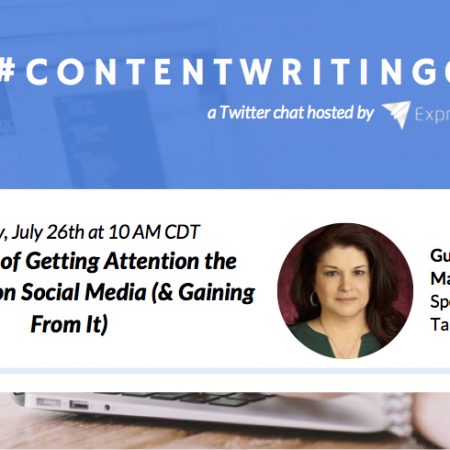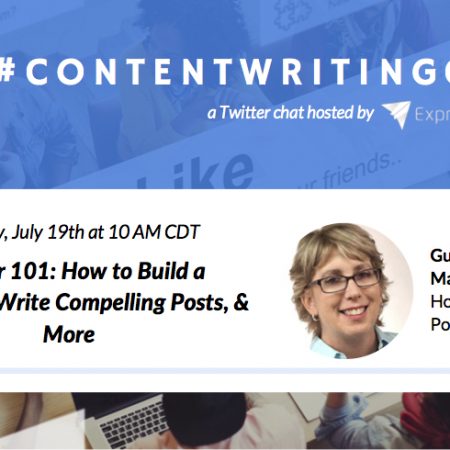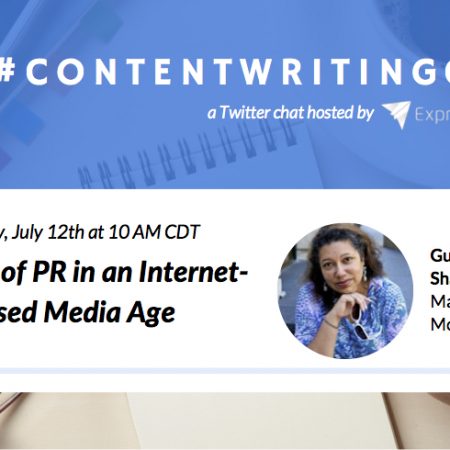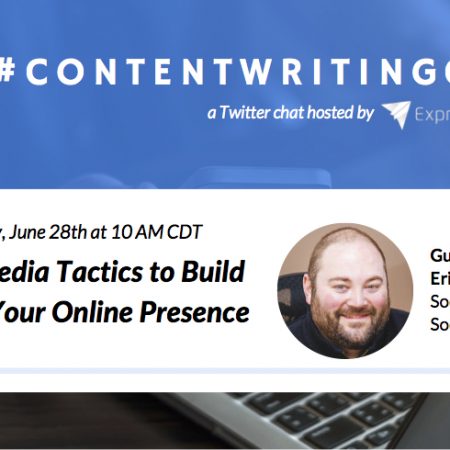#ContentWritingChat Recap: How to Build Data-Driven Content Curation with Ross Quintana
Did you miss #ContentWritingChat this week? Get caught up with our recap and learn all about data-driven content curation! #ContentWritingChat Recap: How to Build Data-Driven Content Curation with Ross Quintana Join us for #ContentWritingChat on August 23rd at 10 AM CDT with @Ross_Quintana! pic.twitter.com/5XgQXdwvze — Express Writers (@ExpWriters) August 16, 2016 Our guest host this week was Ross Quintana. Ross is a growth hacker and also the founder of SocialMagnets.net. Q1: What are the benefits of data-driven content curation? What are the benefits of data-driven content curation? Find out what some of the people in Tuesday’s chat had to say: Data Driven Content Curation Ensures the work you do in social is targeted and drives business goals. #contentwritingchat — Ross Quintana (@Ross_Quintana) August 23, 2016 Using data and analytics actually allows you to get more results with less time and money. #contentwritingchat — Ross Quintana (@Ross_Quintana) August 23, 2016 As Ross said, data-driven content curation ensures the work you’re doing is targeted and driving your business goals. That’s a must! When you utilize the data and analytics that are available to you, you can maximize your results with less time and money. A1: Benefit of ANYTHING data-driven: solid proof of what’s working so you can align goals #ContentWritingChat https://t.co/k3iA2d5B2T — ThinkSEM (@ThinkSEM) August 23, 2016 Sarah knows that it allows you to see what’s working and offers proof. You can align your goals accordingly. A1: More traffic, more feedback, more authority, and higher rankings on SERPs. #contentwritingchat — Edanry Rivera (@Edanry) August 23, 2016 Edanry, our Senior Editor, said it helps you to gain more traffic, more feedback, more authority, and can help you rank higher on SERPs. A1: Data adds authority and credibilty to your content to position you as a though leader #ContentWritingChat https://t.co/oT9mExg2dA — The Digital Chic (@TheDigitalChic) August 23, 2016 A1: Data-driven content establishes credibility. Shows you did your research and know what you’re talking about. #contentwritingchat — Netvantage Marketing (@netvantage) August 23, 2016 Data can help build your authority and credibility through the content you share. Ultimately, it can encourage others to view you as a thought leader in your industry. A1 Data-driven content is based on something – analytics, metrics, ROI – and is not pulled out of thin air. #contentwritingchat — Shannon Mouton Gray (@ShannonRenee) August 23, 2016 As Shannon said, data-driven content is based on analytics, metrics, and ROI. A1. Using data to determine what content your readers like the most only encourages you to produce even better content. #contentwritingchat — BrandBlox (@BrandBloxNet) August 23, 2016 Data can help you determine the kinds of content your readers are most interested in, which helps you produce better content. A1 If you tie your curation strategy to data/analytics, you’ll get firm proof & knowledge of your content working (ROI) #ContentWritingChat — Julia McCoy (@JuliaEMcCoy) August 23, 2016 Our CEO, Julia, said that you’ll get firm proof and knowledge of whether or not your content is working when you tie your curation strategy to data. Q2: Can’t people just share whatever content they find or like? Can’t you just share anything that you like? Check out this advice from the chat: Sharing content you randomly like doesn’t make sense for businesses because they are not likely their target client. #contentwritingchat — Ross Quintana (@Ross_Quintana) August 23, 2016 It is hard to drive consistent results with random efforts. #contentwritingchat — Ross Quintana (@Ross_Quintana) August 23, 2016 Ross is spot-on with his answer! Sharing random content just because you like it doesn’t necessarily make sense for your business. It won’t help you achieve your goals and can lead to attracting the wrong audience. He also said it’s hard to drive consistent results with random efforts, so it’s important to be strategic about the content you’re sharing. A2. Everything you share should be content you like AND be useful to your audience. #contentwritingchat — Kristen Dunleavy (@KristenWritesIt) August 23, 2016 Kristen knows you should think about your audience with everything you share online. Your content should be useful to your audience and you should like it as well. A2: There is little point in sharing just for sharings sake if you are hoping to gain benefits #ContentWritingChat — Andy Drinkwater (@iqseo) August 23, 2016 As Andy said, there isn’t much point in sharing just for sharing’s sake. The content you share online should serve a purpose. A2: They can, but what good does it do it if isn’t accurate? Make sure a piece is worth sharing before doing so. #contentwritingchat — Netvantage Marketing (@netvantage) August 23, 2016 Here’s some great advice to keep in mind: make sure a piece is worth sharing. Q3: Is there a formula for building data-driven content curation? Is there a specific formula you should follow? Here’s what we found out during Tuesday’s chat: The formula for building data driven content curation is research, strategy, planning, analytics, and optimization. #contentwritingchat — Ross Quintana (@Ross_Quintana) August 23, 2016 Ross said it’s all about research, strategy, planning, analytics, and optimization. A3: Yes! 1) Know thy audience. 2) Know what they convert on. 3) Curate that type of content. #ContentWritingChat https://t.co/g192yGIZGI — ThinkSEM (@ThinkSEM) August 23, 2016 Sarah’s advice is to know your audience, know what makes them convert, and then curate the content that works. A3. As with all content? identify who your audience is, what they’re looking for and make yourself interesting! #ContentWritingChat — Cheryl Joy (@CherylJoy2) August 23, 2016 Cheryl believes the formula is all about identifying your audience, knowing what they’re looking for online, and finding a way to make yourself interesting. A3 There isn’t a formula, but you need a process to use your time effectively. #ContentWritingChat https://t.co/RbHAr5Libw — Erika Heald (@SFerika) August 23, 2016 Erika doesn’t believe there is a set formula, but recommends creating a process to help you use your time more effectively. A3. Everyone’s formula is different. Discover your own w/ analytics, experience & reading everything in your niche. #contentwritingchat — Kristen Dunleavy (@KristenWritesIt) August 23, 2016 … Read more


